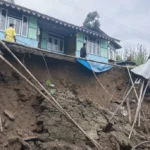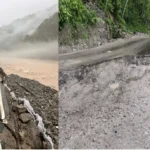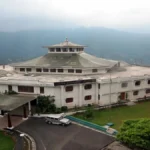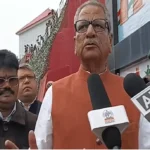High in the mountains of Sikkim, along the winding Jawaharlal Nehru Road, villagers from Gnathang and Kyangnosla have lived for generations, guarding India’s borders, preserving forests, and farming some of the toughest terrain in the country. Yet, despite their sacrifices, they have no legal rights to the land they call home.
Last week, a group of these villagers gathered at the residence of Rajya Sabha MP Dorjee Tshering Lepcha to thank him for raising their plight in Parliament. Their message was simple: “We protected India’s borders. Now we fight for our land deeds.”
This is the story of a growing movement—one that blends history, national security, and a fight for survival at 13,000 feet.
A Legacy of Service—With No Land to Call Their Own
For over a century, the people of Zuluk, Gnathang, and surrounding villages have played a crucial role in India’s border security. Their ancestors were among the first to resist incursions along the Indo-Tibetan frontier. Even today, they act as unofficial sentinels, reporting suspicious movements to the Army.
But while they serve the nation, their own legal status remains uncertain. Most families lack permanent land titles, living instead on “temporary settlements” that could be revoked at any time.
“Our grandparents fought for India in 1962. Now, we are fighting just to stay on our own land,” said an elderly villager from Zuluk.
The Legal Black Hole: Why Sikkim’s Border Villages Fall Through the Cracks
The Forest Rights Act (FRA), 2006, was designed to grant land rights to forest-dwelling communities. But in Sikkim, the law has barely been implemented, leaving border villages in limbo.
MP Lepcha has repeatedly raised the issue in Parliament, demanding either FRA enforcement or a new state-specific law. “These people are not encroachers. They are protectors of the land. The law must recognize that,” he said in a recent Rajya Sabha debate.
Key Facts:
-
0% of eligible Sikkim border villagers have received land titles under the FRA.
-
3,500+ families in Gnathang, Kyangnosla, and Zuluk live without permanent settlement rights.
-
2023 Government Report acknowledged the issue but offered no concrete solutions.
Vibrant Villages or Empty Promises? The Development Dilemma
The Indian government’s ₹4,800 crore Vibrant Village Programme aims to boost infrastructure in border areas. Roads, schools, and digital networks are being built—but villagers ask: “What good is a new road if we can be evicted tomorrow?”
Panchayat President Pema Sherpa, who attended the meeting with MP Lepcha, said: “Development is welcome, but without land rights, we are building on sand.”
Meanwhile, across the border, China has rapidly expanded villages and military posts, making Sikkim’s land rights issue a matter of national security.
Culture, Livelihoods, and the Fear of Disappearing Heritage
The struggle isn’t just about land, it’s about survival. The Lepcha and Bhutia communities rely on the mountains for farming, medicinal herbs, and tourism. Without ownership, their way of life is at risk.
-
Tendong Lho Rum Faat, a traditional festival celebrating mountain gods, could fade if villages are displaced.
-
Homestay tourism, a key income source, is stalling because families can’t legally expand their properties.
“If we lose our land, we lose our identity,” said a young homestay owner in Gnathang.
What’s Next? The Fight for a Fair Solution
MP Lepcha has vowed to keep pushing in Parliament. Villagers are organizing petitions and social media campaigns. And the Sikkim government has hinted at possible policy changes, though nothing is confirmed.
Three Possible Outcomes:
-
FRA Implementation – The easiest fix, but requires political will.
-
State-Specific Law – A longer process, but could offer stronger protections.
-
Status Quo – Villages remain in legal uncertainty, risking eviction.
Conclusion: A Test of India’s Promise to Its Border Protectors
The people of Sikkim’s border villages have given India decades of service as soldiers, environmental stewards, and cultural guardians. Now, they ask for one thing in return: the right to call their land home.
As MP Lepcha put it: “This is not just about deeds. It’s about justice.”
The question now is whether India will listen.










